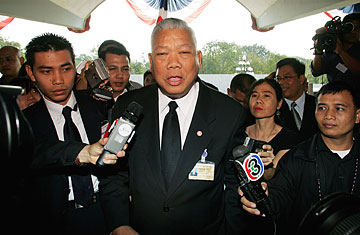
Samak Sundaravej, Thailand's new Prime Minister, speaks to the press outside parliament in Bangkok, Jan. 28, 2008
Less than six months ago, Samak Sundaravej's political career was all but dead: after his election to Thailand's senate was negated by the 2006 military coup, the former Bangkok governor had gone back to hosting a popular TV cooking show. But on Tuesday, the 72-year-old firebrand, once called a "devil" by democracy activists for his support of past right-wing military regimes, was formally voted in as Thailand's 25th prime minister by the country's first elected parliament since the Generals took power. Yet the question remains: will Samak really be running Thailand?
Samak has proudly proclaimed himself the nominee of Thaksin Shinawatra, the prime minister ousted by the army in September 2006 and now living in self-imposed exile in Hong Kong. And that's where high-level members of Samak's People Power Party — widely regarded as Thaksin's proxy political vehicle — flocked over the weekend to start lobbying for Cabinet posts. "Samak faces real credibility problems," says Panitan Wattanayagorn, a political scientist at Chulalongkorn University in Bangkok. "Of course, he's not the one in charge."
Thaksin, who has said he will return to Thailand in April or May, is facing a court case stemming from an allegedly corrupt land sale while he was prime minister. (Thaksin has denied any wrongdoing.) He and 110 other members of his former political party, Thai Rak Thai, have also been banned from politics for five years for electoral fraud. Samak has vowed to amnesty them all, and disband the military-appointed committee investigating Thaksin on other corruption allegations.
But despite the PPP's victory in the Dec. 23 national elections, Thailand remains politically divided. While the PPP won a near-majority of parliamentary seats, it virtually tied with the opposition Democrat Party in a simultaneous party list vote — signaling that many who voted the PPP into power are nonetheless ambivalent about either Samak or Thaksin leading the country. Quashing the investigations could spark a backlash from the hundreds of thousands who protested in the streets against Thaksin before the coup. It could also fracture Samak's six-party coalition government, as some members joined on conditions that the government not interfere in the cases against Thaksin.
Samak comes with his own political baggage as well. In addition to his controversial past and confrontational political style, he is also being investigated for corruption in the procurement of fire-fighting equipment while governor, a charge he dismisses. ("If I was corrupt I could not have come this far," he told TIME in an interview last month.) And while he is recognized as a seasoned political campaigner, critics have called Samak a lackluster administrator who as governor preferred to focus on his TV show than visit neighborhoods flooded during Bankok's annual monsoon. Panitan says it is questionable whether he is up to the task of solving Thailand's complex political and economic problems.
Samak's toughest challenge, however, may be dealing with the military. With his election, Thailand has peacefully returned to civilian rule for the first time since 2006 and, more or less, to a situation of normalcy — due largely to the coup leaders' willingness to stand by their word not to interfere in December's elections. Should Samak seek revenge against those involved in the coup, or put officers loyal to Thaksin in charge of the military, he could sow the seeds of another takeover. As Panitan says, "Coups never happen for a single reason." Reports in the Thai press have also fueled speculation that the abrasive Samak could be replaced by a more conciliatory leader. If the economy continues to falter, or if the new government overspends its political capital trying to rehabilitate the exiled Thaksin, his time at the top could be short-lived.
